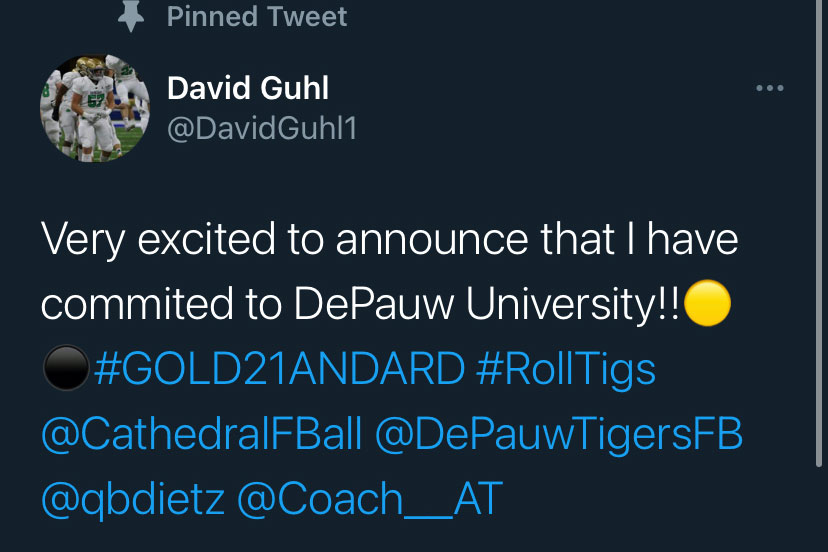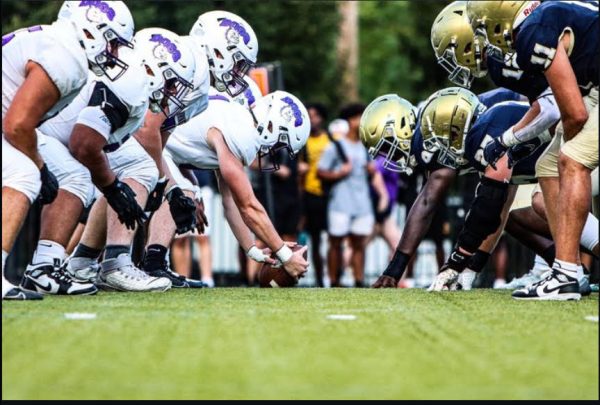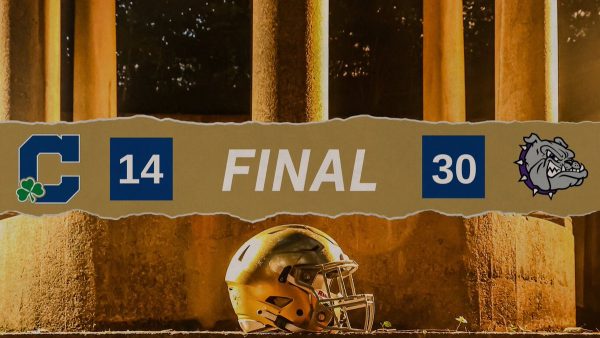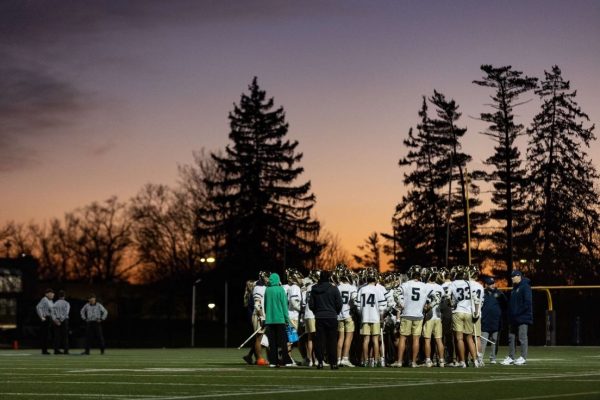Despite Covid restrictions, athletic recruiting continues
Making personal connections is a challenge during pandemic
Senior David Guhl used social media to announce his commitment to DePauw.
After ending their high school careers on top, seven seniors on the football team look to play at the next level.
Recruiting has been altered due to the NCAA restrictions in response to the Covid-19 pandemic. The NCAA has limited both what high school athletes and college coaches are permitted to do. This has affected the overall exposure for high school athletes, especially those not playing a season at all.
The pandemic hit right before a critical time in recruiting for rising seniors in the Class of 2021. These student-athletes were unable to meet coaches, attend camps or go on unofficial visits to prospective colleges. The Irish football program was also unable to host the yearly college showcase, which in the past drew more than 100 college coaches from across the nation to the Hill. This left players and coaches with only the internet to connect and build relationships.
Seniors were left with limited ways to gain exposure, especially if they were relying on summer camps as a way to get eyes on them entering their final year of high school. This key evaluation time was lost as was the bonding between coaches and recruits.
Senior defensive lineman David Guhl mentioned the most detrimental part of the dead period was a lack of exposure. He recalled his brothers, Ryan Guhl ‘16 and Andy Guhl’s ‘18, experiences in the recruiting process.
Ryan played three seasons at Illinois State as a defensive lineman and Andy is a junior on the Indiana University rugby team, playing prop. The younger Guhl said, “Their senior years they would be going to all the camps in the summer. And I never got to because they were all closed. I’ve just had to turn to following coaches on Twitter and seeing if they follow back. I just keep posting film on Twitter to see if I can gain exposure.” Guhl is a three-sport athlete who participates in rugby and wrestling along with football.
Another challenge for the Class of 2021 involved the decision by the NCAA to pass the blanket eligibility rule. This rule states that everyone who played college football this season is granted an additional year of eligibility.
This results in complications for college coaches trying to figure out how many spots they have for incoming recruits. Now on top of balancing incoming freshmen and transfers, coaches must figure out who is staying for another year.
This leaves coaches with some tough decisions. Along with seniors being able to return for a sixth year, freshmen in the Class of 2024 are also granted five years of eligibility, essentially affecting college rosters for years to come and leaving fewer spots for incoming recruits.
Guhl mentioned that during his recruitment he was aiming to play at either the NAIA or DIII level. He said, “At the smaller divisions, the seniors that stay for a fifth year take scholarship money that the programs don’t have for incoming freshmen.”
While DI schools may be stretched thin with their athletic scholarships, it pales in comparison to how thin the DII and NAIA schools will operate. For comparison, Division I FBS programs are allotted 85 athletic scholarships for their football players, while DII football is allotted 36 athletic scholarships and NAIA is allowed just 24.
DII rosters typically include at least 100 players, some being walk ons, but a majority of those players receive some portion of an athletic scholarship. This leaves schools such as University of Indianapolis, a DII program, with less scholarships for incoming freshmen.
Senior cornerback Zane Hill mentioned one of his experiences in the recruiting process. He said, “A DI FCS coach called my cornerbacks coach and said they would offer me, but they don’t have enough money to offer any more kids. So they are trying to get me to walk on. And then they talk about how coach lets kids walk on and if a scholarship opens up they give it to them.”
Hill cited his frustration, saying, “You can’t get anybody to talk to you because they don’t have any scholarships left to offer.”
Senior outside linebacker John Paul Koscielski also is looking to play at the next level after pleasantly surprising many with his performance on the defense after he moved from tight end to outside linebacker during the summer.
With Koscielski uncertain if he would decide to play in college next season, missing camps hurt his chances to get exposure, whikle other athletes who have already been to camps have made connections with coaches. He said, “I feel like coaches coming into Cathedral was a big part of the process when we were in school, practice or at games.”
To gain ground on his competition, Koscielski said, “I’ve been sending a lot of emails and DMs on Twitter, trying to get as much exposure as possible.” Despite the circumstances, he said, “I’m happy with what I’ve received. I feel like in a different year we could have more people going to bigger schools.”
Koscielski is currently considering DePauw, or Marian or possibly walking on to a higher level school such as Miami of Ohio to continue his athletic and academic career.
Guhl said he believed making the most of the season assisted in his recruiting. He said, “It definitely helped getting the (Class 5A) State championship. Getting the exposure from that and playing with some of the big name guys brought some looks. You make a play and the recruiters go, ‘who is that?’”
Guhl committed to DePauw University on Jan. 21. He said, “DePauw’s campus and its people stuck out to me, there’s nothing like it. A lot of good football players have committed as well, and we are looking really good.”
Senior quarterback Nathan McCahill committed to DePauw on Jan. 26.
Hill was optimistic on going to play for a DIII program. He said, “They focus on life after football and on getting a good job out of college.” His short list includes Illinois Wesleyan, Wabash, Marian, UIndy and St. Francis.
Unlike Koscielski and Guhl, Hill was dissatisfied with his options. He said, “I feel stuck in the middle. I’ve just been taking whatever I can get, sending my film out, seeing if they mess with me.” He said he felt that the fact that college coaches cannot come to campus definitely hurt his chances.
Hill said, “Now you have to go on individual visits to school. You have to travel to them. No official visits. No game day visits.”
Hill made up for this on the field though receiving many honors this year highlighted by being named second team all-State by MaxPreps and all-City as a defensive back.
He accredited his heightened level of play to Mario McCullough, referring to a team member who passed away last spring, saying, “We played as a team really well. We had a purpose to play for this year, and I think that just made everybody play harder. Everybody knew who it was for. It was for Mario. We recognized him every game. We went out there and fought every game.”
In all three of these players’ cases, senior year was a critical time for their recruiting process. Because of their solid senior seasons, they were able to make the most out of a difficult recruiting situation, but they still are awaiting the validity of these potential offers as things can change in an instant during this time.
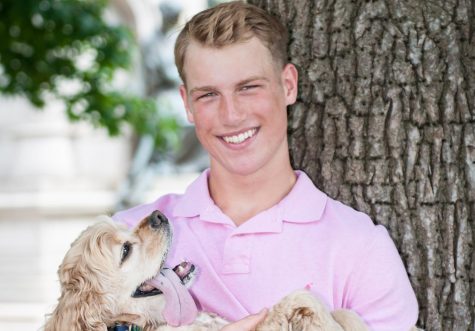
Jake Langdon is a member of the Class of 2021. He is a reporter and videographer. He plays running back for the varsity football team and runs hurdles...


